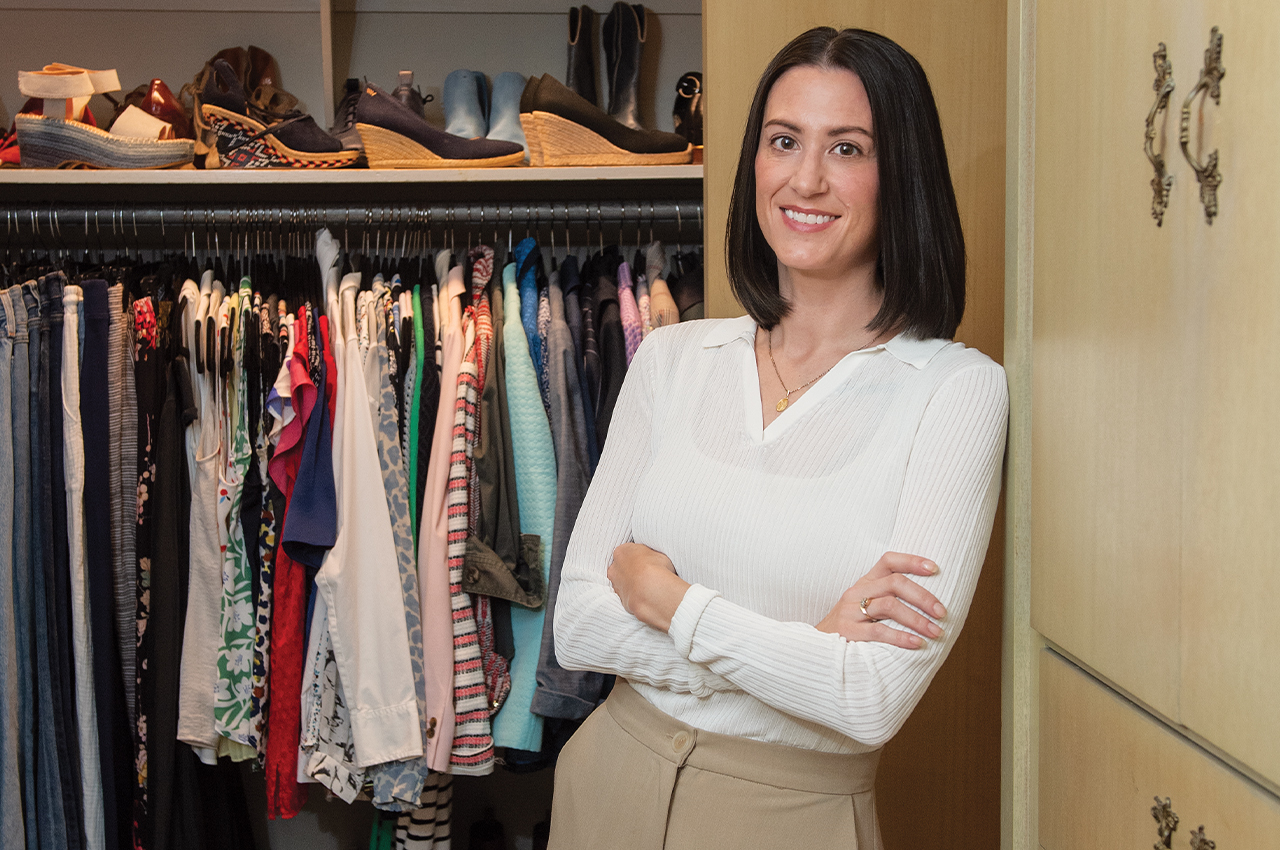Writer: Anthony Taylor
Photographer: Duane Tinkey
On a perfectly normal July day in 2020, six years after she lost her father to cancer, Danyelle Crowell’s mother died from Alzheimer’s complications.
“It destroys you,” she said, as tears welled up. “After you go through really major traumatic stuff like that, you just want life to be easier.”
And right there, in a moment of profound honesty and grief, Crowell (pictured above) articulated her new mission statement. She had her parents in mind in 2022 when she founded Simplify & Organize to help people in Central Iowa declutter their homes, especially after periods of transition. The traits she inherited from Lynn and Lynda Crowell — kindness, empathy and a protective nature — have made Crowell a natural helper, and it was the fathomless feelings of grief and loss after their deaths that drove her to seek out others who were tending to similar wounds.
“There are different levels of grief and different ways to deal with it,” she said. “When someone dies, you have the physical loss of a person, but then you’re also having to go through their things and decide what to do with these last physical pieces of them.
“Sometimes people get very strong feelings of guilt, because they feel bad about getting rid of this person’s things.”
Enter: Crowell. A practitioner of minimalism since 2008, the 44-year-old exudes an air of efficiency. She was first attracted to minimalism by the writings of Colin Wright, a blogger and author who travels the world with his 52 worldly possessions in two backpacks. She now dresses from a capsule wardrobe of a dozen or so pieces and examines each potential new purchase with monastic intensity.
It can be easy to hear the word “minimalism” and think of it in the strictest, most reductive terms. You might think of Wright and his backpacks or twee YouTube videos of young couples living in sparsely decorated tiny houses, happily showing off their thrifted futon. But at its core, minimalism is as much about decluttering the mind and spirit as cleaning out your closets and junk drawer.
Crowell often considers a few key questions. “What’s the least amount that you are comfortable living with? What are the least amount of hours you can work at a job in order to get by and be happy? And what’s the baseline number of friends you need to feel fulfilled?”
“It’s not always the physical stuff,” she added. “It starts there, because that’s often the easiest stuff to address. But as you start to take stock of those things, it starts to trickle into the other aspects of your life.”
Minimalism and organization got a bunch of attention during the pandemic, thanks in part to Netflix and Marie Kondo, but Crowell’s approach is more pragmatic. For her, unlike Kondo, it doesn’t matter if a particular item sparks joy. “My spatula doesn’t spark joy,” Crowell said, “but I need one and I use it.”
Crowell understands that not everyone she works with wants to downsize their world into two backpacks, but she believes that the principles she’s developed over the years are applicable to anyone who feels overwhelmed by the clutter of their daily lives. That’s especially true for people who are dealing with the loss of a loved one or for anyone who’s helped a loved one move into assisted living.
She’s worked with a family who lost a child and needed to rearrange bedrooms. She’s worked with recovering alcoholics, and a disabled veteran who had moved into assisted living. One of her current clients wants to adopt a van life.
“Our time is so limited. The least you can do is try and be happy,” she said. “Helping people get the mess out of the way, so they can see what’s left and figure out where forward is from there, that’s what I do.”
Even though most of her clients are dealing with the pain and confusion that accompanies grief, she believes her services can help just about anyone, even for a single specific purpose. “I worked with one woman who was having friends from out of town visit and really just needed help with the spare bedrooms in her basement, getting them looking more hospitable,” Crowell said.
She’s quick to point out that she’s not a cleaning service. If you’re looking for someone to vacuum and dust, that’s a different phone call. But if you’ve moved to a smaller space or don’t know how you’ve collected so many knickknacks over the years or just need a firm but empathetic eye to help go through your mom’s stuff, Crowell is the woman for you.
One of her former clients, named Megan Fitzgerald, had recently moved to a new home in Des Moines while juggling a full-time job and the care of two toddlers. “I was completely overwhelmed and dealing with a very depleted emotional state,” said Fitzgerald, who found Crowell online. “She knew exactly what to do. Helped me unpack, decided what made sense to keep and what made sense to donate. She not only transformed my space, she helped transform my quality of life. It truly was a form of therapy and an experience I continue to use.”
It’s really that phrase, about transforming the quality of life, that sums up Crowell’s minimalist philosophy. It’s her staunch belief that everyone can benefit from “freedom from stuff,” whether you’re paring down your house to the bare essentials, repurposing a bedroom in an empty nest or just trying to streamline your wardrobe.
“It’s freedom,” Crowell said. “Not in the Constitution sense, but in the freedom to decide who you are and who you’re with, how you spend your time and your money, and what you invest yourself in.
“We are more than the things that we own.”











